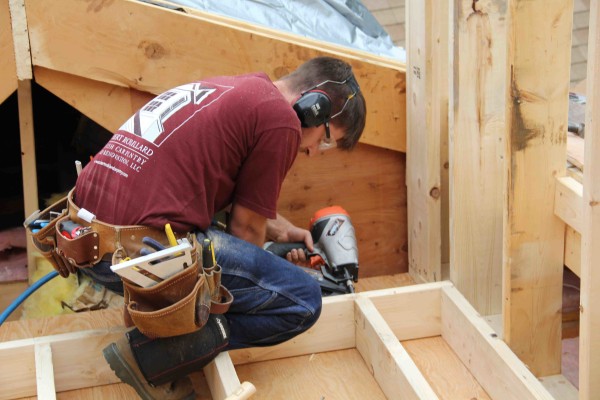Owning Your Own Carpentry Business
So you want to go out on your own?
Many — may be most — tradesmen and women get the urge sooner or later to strike out on their own. To work for themselves. To be in control of their jobs and fate. To get “all the money”. But: is it right for you?
Hanging Up The Tool Belt
Honestly, it’s not right for most people, no matter what their profession. There’s an old truism in the business world that the best person at a job is usually not the best person to manage that job. This is probably the most obvious in sales. A great salesperson has great sales skills: confidence, super-human initiative and ambition, inter-personal communications, the ability to read people, likeability, and so on. These are field skills. In contrast, a great sales manager — someone who manages salespeople — has a more administrative job. They have to work with corporate, analyze spreadsheets, lead organizations, build teams, hire and fire people, set goals, and so on. Few truly great salespeople make good sales managers because the skill sets required for the jobs are very different.
Management Skills
Likewise, the skills required to form, sell, and manage a trade business are quite different from the skills needed to do that trade. The best electrician or carpenter isn’t always the most successful electrical or carpentry contractor.

Business Owner Skills
Here’s a partial list of the skills and things to consider that a business owner needs, in addition to the ability to do the actual job you get hired for.
- Right off the bat, do you really have the broad skills to do the entire job? You may be a great residential electrician, but do you have the product knowledge, code knowledge, and on to stretch a bit into light commercial or housing developments? Do you have the tools that would be required for that? Heck, do you have all the tools you need to continue doing what you know you can do, or have you been relying on your employer’s tools?
- Do you have a contract that is legal and will protect you?
- Do you have the supplier connections? Do you have credit with them? Will you be good about paying them on time? (If you don’t, there goes your credit!)
- Running a business is a paperwork-intensive affair. Are you good at paperwork? Are you conscientious about doing it every week, if not every day? Do you even know what paperwork your accountant and your bank will require?
- Do you practice good office business practices? Are you productive?
- You will probably have to pay your taxes quarterly. This means that your tax paperwork will have to be kept in order more-or-less all the time. Can you do this? Do you have the discipline to set aside money to pay taxes?
- Do you have the capital for the tools and vehicles you will need?
- Can you live on just the jobs you can do all by yourself? If you’ll need help, can you get it reliably?
- Do you know how to manage your time? In business for yourself, you’ll have to find the time, not just to do the actual work, but to do paperwork, sell jobs, bid jobs, maintain equipment and vehicles, and a dozen other things.
- Can you save part of your income each and every week? No matter how good things are now, slow times always come and you’ll absolutely need those savings to get you through them.
- Can you budget to plow back some of your income into tools, repairs, or a new truck?
- Are you reliable? Being late or a no-show on a big job is maybe something you can get away with for a time. Do those things when you’re in business for yourself and you’ll soon get a bad reputation and the phone won’t ring.
- Do you write professional emails? Do you return them promptly?
- Will you return your calls? When times are good too many independent guys simply don’t return calls for new business if they don’t need it right then. This is unbelievably rude. Remember that slow times always come; no one whose call you didn’t return will call you then, and neither will anyone that they told about your rudeness…and you will deserve that fate! The traditional way this used to be handled was that the tradesman (it was usually a man back then) did the work and his wife handled the phone and paperwork. That model doesn’t work with single people or two-income couples though. If you hate answering your cell phone all day long while you’re trying to work, here’s a way to maintain goodwill even if you have to refuse the job and are too busy to answer the phone. Simply have your voicemail greeting say something like:
Thanks so much for calling Smith Contracting. If you’re calling about new work, I truly apologize but I’m booked up right now for the foreseeable future. I do hope you’ll think of me for future projects, though. If you’re calling for another reason, please leave a message after the beep.
- Are you presentable? What your prospective customers expect to see when you show up varies by location and type of business. If a carpenter shows up in a business suit, any customer will think that they’re being shilled. But if you show up looking like you just crawled through a sewer, they won’t trust you to be professional. If you can’t dedicate an occasional day to prospect visits in clean clothes and a collared shirt, at least say something like this to a home or business owner: Sorry for the (dirty) work clothes; I know you wanted me to swing by as soon as I could and I just got off work. No one will take offense at that, and most people who aren’t blue-collar themselves will appreciate it.
Are you ready to do this?












